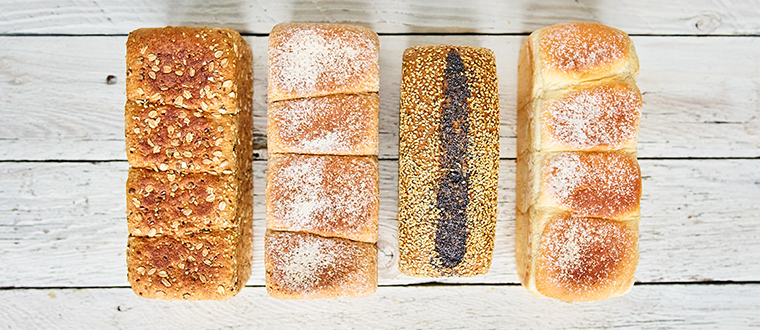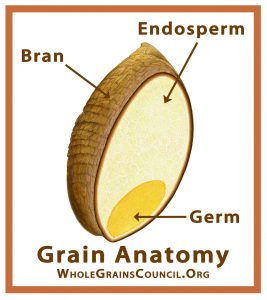THE TRUTH ABOUT GRAINS

Written by Registered Dietitian, Stephanie Dang
With all the conflicting nutrition information out there, it’s hard to navigate your way to the truth. Gluten-free, low carbohydrate, and grain-free diets are among the many different diets that are advertised. But why are carbohydrates often treated as the enemy? Stephanie Dang, Registered Dietitian, is here to explain why whole grains should be be embraced, not feared!
Before we get started, let’s clear up some terms:
- Whole Grains: contains 100% of its 3 original parts – the bran, the germ, and the endosperm
- Bran: the outer skin, which contains fibre, antioxidants, and vitamins
- Germ: contains healthy fats, as well as some vitamins, minerals, and protein
- Endosperm: contains mainly carbohydrates and protein1

- Whole wheat: contains at least 95% of its original kernel (1)
- Refined Grain: a grain that has been stripped of at least 1 of its original components. This stripping process removes protein, along with some important vitamins and minerals.(1) Example: white rice, white flour
- Enriched Grain: the enrichment process adds back some (but not all) of the nutrients to refined grains. Example: enriched wheat flour
So why should we include whole grains and whole wheat products in our diet?
- A diet rich in whole grains and whole grain products is associated with a lower risk of chronic diseases, including cardiovascular disease, type 2 diabetes, and some cancers, and may lower the risk of stroke (4)
- Whole grains are rich in antioxidants, and contain anti-inflammatory properties (3,12)
- The fibre in whole grains has an LDL Cholesterol (“bad” cholesterol) lowering effect (6), and may be the most effective type of fibre for reducing the risk of type 2 diabetes (7)
- Including whole grains in your diet can contribute to improved gut bacteria and gut health (8)
- People who eat the most whole grains have a lower body mass index, waist circumference, and are more likely to be at a healthy weight for their height, age, and gender
- Compared to refined grains, whole grains may have a positive effect on metabolism (10)

If this list isn’t enough to convince you that we need whole grains in our diet, let’s discuss why the common grain-related diets may not be beneficial for you (specifically, gluten-free, grain-free, and carbohydrate-free diets). It is important to understand that none of these diets are the same.
- Gluten: refers to the proteins found in various grains, such as wheat, rye, barley, and triticale, as well as other foods. Many grains are actually naturally gluten free. (11)
- If you have been diagnosed with celiac disease, you should follow a strict gluten-free diet. However, if you do not have celiac disease, there is no evidence showing that a gluten-free diet will be beneficial. In fact, many gluten-free products require additives (such as sugar and fat) to make the taste and texture appealing.
- Grain products: foods made from cereal grains, such as wheat, barley, rye, cornmeal, rice, oats, etc. For example, bread, pasta, cereal, granola bars, crackers, popcorn, and rice.
- Carbohydrates: the sugars, starches, and fibres that are found in fruits and vegetables, grains, milk products, and many processed foods. They are our main source of energy!
The reason why these diets may seem appealing is that they actually cut out most “junk food”. For example, cookies, cakes, muffins, many fried foods, processed and packaged foods, etc. And these diets work because you cut out these higher calorie foods, not because of cutting out all grains/gluten/or carbohydrates. Additionally, following a carbohydrate-free or low carbohydrate diet eliminates so many nutritious foods that contain important vitamins and minerals! When you restrict carbohydrates, you are putting yourself at risk for nutrient deficiencies. Not to mention the fatigue resulting from restricting your body from its preferred energy source.
But are there grains that we should be avoiding? The answer to this is quite simple – eat everything in moderation! Choose whole grains more often (whole grain or whole wheat bread, whole wheat pasta, oats, quinoa, etc.), and refined/enriched grains less often (white bread, white pasta, baked goods, packaged and processed foods). A slice of white bread won’t kill you, but incorporating whole grain bread into your regular diet can have incredible positive effects on your health. Wondering how to incorporate more whole grains into your diet? Stay tuned for our weekly recipes!
 Stephanie Dang, Registered DietitianStephanie Dang, Registered Dietitian, has partnered with COBS Bread to help empower their customers to make healthy choices and positive lifestyle changes. Stephanie is passionate about helping clients reach their nutrition and wellness goals by providing them with evidence-based nutrition recommendations, resources, and support. As a nutrition consultant for COBS Bread, she hopes to inspire you to make healthy choices and nourish your body with nutritious foods!
Stephanie Dang, Registered DietitianStephanie Dang, Registered Dietitian, has partnered with COBS Bread to help empower their customers to make healthy choices and positive lifestyle changes. Stephanie is passionate about helping clients reach their nutrition and wellness goals by providing them with evidence-based nutrition recommendations, resources, and support. As a nutrition consultant for COBS Bread, she hopes to inspire you to make healthy choices and nourish your body with nutritious foods!
References:
(1) “What’s a Whole Grain? A Refined Grain?” What’s a Whole Grain? A Refined Grain? The Whole Grains Council, https://wholegrainscouncil.org/whole-grains-101/whats-whole-grain-refined-grain.
(2) Rui Hai Liu, Whole grain phytochemicals and health, In Journal of Cereal Science, Volume 46, Issue 3, 2007, Pages 207-219, ISSN 0733-5210, https://doi.org/10.1016/j.jcs.2007.06.010.
(3) Ozawa M, Shipley M, Kivimaki M, et al. Dietary pattern, inflammation and cognitive decline: The Whitehall II prospective cohort study. Clin Nutr. 2016;pic: S0261-5614(16)00035-2.
(4) Liqun Fang, Wen Li, Wenjie Zhang, et al. Association between whole grain intake and stroke risk: evidence from a meta-analysis. Int J Clin ExpMed. 2015; 8(9): 16978–16983.
(5) Aune D, Keum N, Giovannucci E, et al. Whole grain consumption and risk of cardiovascular disease, cancer, and all cause and cause specific mortality: systematic review and dose-response meta-analysis of prospective studies. BMJ. 2016;353.
(6) Wang H, Lichtenstein AH, Lamon-Fava S, et al. Association between statin use and serum cholesterol concentrations is modified by whole-grain consumption: NHANES 2003-2006. Am J Clin Nutr. 2014 Oct;100(4):1149-57.
(7) InterAct Consortium. Dietary fibre and incidence of type 2 diabetes in eight European countries: the EPIC-InterAct Study and a meta-analysis of prospective studies. Diabetologia. 2015;58(7):1394-408.
(8) Falony G, Joossens M, Vieira-Silva S, et al. Population-level analysis of gut microbiome variation. Science. 2016;352(6285):560-4.
(9) Albertson AM, Reicks M, Joshi N, et al. Whole grain consumption trends and associations with body weight measures in the United States: results from the cross sectional National Health and Nutrition Examination Survey 2001-2012. Nutr J. 2016 Jan 22;15:8.
(10) Substituting whole grains for refined grains in a 6-wk randomized trial favorably affects energy-balance metrics in healthy men and postmenopausal women
J Philip Karl et al. Am J Clin Nutr. 2017 Mar; 105(3): 589–599. Published online 2017 Feb 8. https://www.ncbi.nlm.nih.gov/pubmed/28179223
(11) “What Is Gluten?” Celiac Disease Foundation, https://celiac.org/live-gluten-free/glutenfreediet/what-is-gluten/.
(12) Vitaglione P, Mennella I, Ferracane R, et al. Whole-grain wheat consumption reduces inflammation in a randomized controlled trial on overweight and obese subjects with unhealthy dietary and lifestyle behaviors: role of polyphenols bound to cereal dietary fiber. Am J Clin Nutr. 2015;101(2):251-61.
